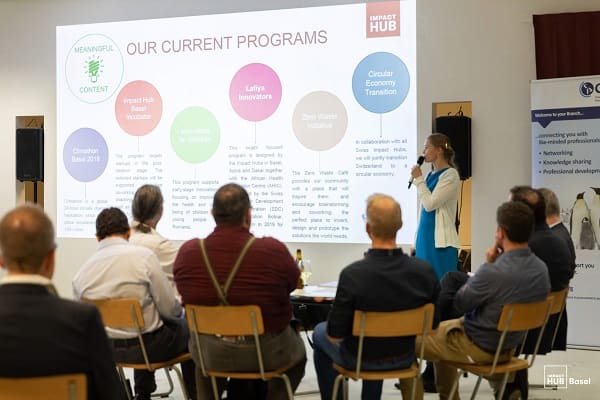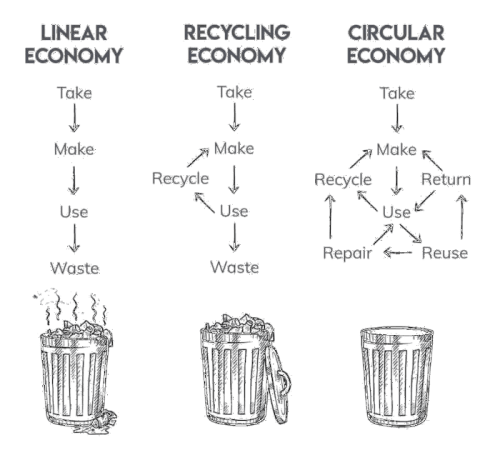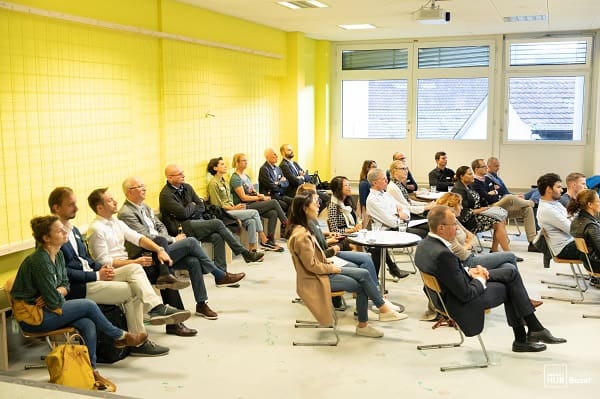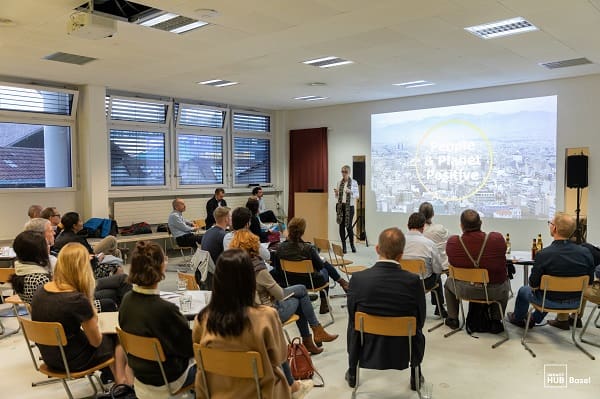In our latest event with the Chartered Institute of Procurement & Supply, we explored how to turn the potential risks associated with making procurement and supply systems circular, into beneficial (and profitable) opportunities. An evening of dynamic and thought-provoking speakers in our (now open!) space in Dreispitz made for an entertaining and educational Thursday evening.
More than recycling
Circular economy is not just about waste management – it’s about changing how we fundamentally view the goods we consume, and becoming more cognizant of the entire life of a product. Our event opened with an introduction by Olena Bolger, our Local Circular Economy Transition Program Coordinator, about Impact Hub Basel and how CE played a role in developing our coworking space. Through our interior designers, we managed to fill our space with as much re-used furniture as possible. As well, we upcycled various materials to give them a new life – if you’ve been in our space (I’d highly recommend it), you’ve probably had a seat in our plush industrial spool chairs. In our events room, we only used sustainable building materials.
We’re (thankfully) not the only ones in on this CE craze. SHIFT phones based their business model on eco-friendly and conflict-free materials, and offer easy repairs to their phones – ensuring that you actually keep your phone for more than two years. I’m very guilty of this, but working on it. Converting my life to be CE-friendly (unfortunately) isn’t done overnight.

Circular Economy, like winter, is coming
Our next talk was led by Scott Poynton, Founder and former CEO of The Forest Trust, current Founding Principal at Scott Poynton Sàrl. His 20+ years supporting transformational leadership offer an important insight to any discussion on radically changing systems – there are problems that can really only be solved through openness and collaboration.
CE requires cooperation among all business areas. It’s coming, and companies are going to have to deal with it. This will lead to redesigning and rebuilding supply chains, changing the function of procurement, creatively selling CE to suppliers, engaging with customers in new ways, motivating stakeholders to get on board, learning how to metricize the new gains, and implementing CE across all industries. Easily done in a week, no?
Procurement teams are increasingly encountering issues meeting sustainability levels requested by management teams in the linear economy. And many of them have only started hearing about the circular economy in corporate settings – discussions on this topic are only around five years old. Seconds compared to the hours invested in traditional supply chain management. This discrepancy promotes problems.
Sustainability has always been around, but over the past few years, has made its way into many parts of our daily lives. That said, sustainable raw materials are still difficult to procure, and circular supply chains seem, from the outside, to be needlessly complicated. As with all things, changing and improving takes time and effort. Refocusing procurement specialists to seek out suppliers with the best sustainable offers (versus financial offers) is not too easy to sell, and green-washing is increasingly damaging in advertising. “Procurement under pressure” is not optimal. Thankfully, CE provides a multitude of motivating reasons to encourage this change.

On a superficial level, transforming a system to be circular has a reputational benefit. I’d choose to see a hundred ads communicating a company’s earnest dedication to sustainability over just one aesthetically pleasing ad selling a product made from single-use plastic, and I bet I’m not the only one. The relative infancy of this field is ripe for innovation in all areas of business. CE offers supply chains an option to reduce the waste stream, product developers a way to extend the life of products (which, according to too many studies to link here, leads to higher brand loyalty), and marketing departments a way to increase the target groups of products. An increase of sustainable suppliers also creates the good-kind of competition.

Honesty, Collaboration, and Profit?
There are countless benefits to be gained from converting an organization to a circular business model – mainly in the form of new and exciting opportunities. Thankfully, we were able to share some of these at our event.
Our first case study came from IKEA, a leader in sustainability in the furniture industry. Paolo Romano, a Business Navigation Manager, and Elisabeth Munck af Rosenschold, the Sustainability Manager for Global Transport & Logistics, spoke about the honesty required in transforming a system to CE. IKEA is a market leader is providing products that are easy to repair, reuse, repurpose, and recycle. The guiding principle to this work? To stay people & planet positive. Transport and logistics contribute only 4% to CO2 production, even though IKEA is one of the biggest shippers in world. To reduce this number, IKEA has developed a diverse set of solutions – replacing fossil fuels in transport, fitting more in the same shipment space, and collaborating with as many partners as possible to make a change.

Next, Olga Pavlenko, a Senior Director for Supply Chain at Carlsberg, spoke about how to feel even better while drinking beer. Olga felt a personal responsibility to protect the environment as part of the generation of current business leaders. Seeing bottles thrown into the ocean on a family trip encouraged her to take action. Carlsberg has now developed smaller kegs that hold beer six times as long, and are more efficient for vendors. These kegs are then repurposed to create beautiful green tiles and tables, where demand has now actually exceeded supply. In case you needed anymore motivation to get another pint.
Lastly, Markus Vögeli from the family printing company Vögeli AG spoke about his dedication to circular business and cradle-to-cradle certification. Switzerland is a great place for implementing circular supply chains – we recycle nine out of ten newspapers (go us!). Vögeli has extended this effect by creating plantable business cards, developing sustainable packaging solutions for clients like Calida, and connecting with other printing companies to act as a united front when dealing with suppliers. Not bad for a company of 55 employees.
Let’s procure ourselves some refreshments

After a few hours of insightful presentations, it was time for some vegetarian food, more wonderful wine from our partner Delinat, and engaging conversation. My favorite part of these events is interacting with all of our participants. Conversations starting with exchanging pleasantries and turning into in-depth examinations on the role of interdisciplinarity in evolving systems towards sustainability, motivate my involvement in Impact Hub Basel. Hopefully you have similar experiences.
Going full circle
Want to join in on more of our events? Become a member of Impact Hub Basel today! Find more information here. We’d love to see you around!
Caroline Steiblin
Links
https://www.cips.org/en/
https://www.shiftphones.ch/
http://www.scottpoynton.com/
https://www.ikea.com/ms/en_US/this-is-ikea/people-and-planet/index.html
https://www.carlsberggroup.com/sustainability/sustainability-at-carlsberg/
https://www.voegeli.ch/
https://www.delinat.com/
https://basel.impacthub.net/become-a-member/
